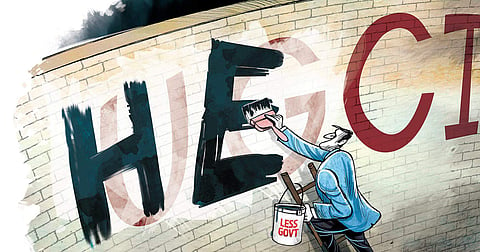

Knock, knock. Who’s there? Yash Pal. Yash Pal who? Yash Pal from heaven. Is it the Yash Pal who kindled an interest in science through Doordarshan? Yes. Why are you here? I saw the draft Bill to repeal the UGC Act. Welcome, I hope you are happy with it. I am here to share my views since I was once UGC Chairman …” and trringg goes my alarm. I woke up in disappointment to realise that the opportunity that I missed in my lifetime, a conversation with the legendary Prof. Yash Pal, was shattered in my dreams too. Shrugging off my disappointment, I pondered for a moment and thanked him for waking me up to the realities of the proposed Higher Education Commission of India (HECI).
The HECI Bill is the Ministry of Human Resource Development’s proposed new Bill to repeal the existing University Grants Commission (UGC) Act of 1956. The Bill provides five foundational principles on which the HECI is assumed to be grounded—less government and more governance, separation of funding, end to inspection raj, academic quality and enforcement powers. Under these five pillars rest long-pending structural reforms in higher education and so, it needs to be welcomed cautiously.
The National Policy of Education (1986) and the Programme of Action (1992) envisaged the creation of a national apex body for greater coordination and integration in our higher education system including research. This overarching responsibility of the UGC disaggregated into more than a dozen professional statutory councils like MCI, BCI, AICTE, etc., created by Parliament; they are now towers of isolated regulation and control. However, stand-alone disciplines of the past are increasingly converging in contemporary times.
An MBBS graduate prescribing drugs works with engineers on smart nanomaterials, for delivery catalysed by chemical formulations invented by science graduates, their vast public impact measured by sociologists and economists, and with intellectual property of the work protected by lawyers; all of them are working in state-of-the-art facilities built by architects and so on. Such coherent synergy in academic functions needs to be subsumed by a unitary apex body that aggregates all these professional bodies. This was the rationale behind Yash Pal’s committee on Renovation and Rejuvenation of Higher Education (2009) which mooted the grand idea of a National Commission for Higher Education & Research (NCHER) which was also in line with the National Knowledge Commission’s Indian Regulatory Authority for Higher Education (IRAHE, 2006).
Pursuant to these, two review committees were constituted in 2015—one for AICTE headed by former HRD Secretary M K Kaw and the other for UGC headed by its former Chairman Prof. Hari Gautam. Later, the draft report of the TSR Subramaniam committee on National Education Policy (2016), which is still a work in progress under a different committee headed by K Kasturirangan, also kept in mind the middle path of the Kaw Committee and the aggressive path of Hari Gautam committee. Amidst many recommendations, it was very vocal on the need for a National Higher Education Promotion and Management Act in line with the NCHER or IRAHE.
Repealing the UGC and assigning regulatory, academic, administrative and disciplinary functions minus funding mechanisms under the newly proposed Higher Education Commission may be a good move, but definitely not enough considering that many reforms have not yet been completed. The MHRD of the NDA has put in place certain path-breaking reforms—learning outcome-based school education, four-year integrated teacher education programme, National Institutional Ranking Framework, autonomy to IIMs, new regulatory framework for institutions of excellence (IoE), graded autonomy to universities, and distance education and MOOC, etc,. Graded autonomy provides much-needed oxygenation from the current strangulation and still puts universities under the policy safeguards of UGC; the new IoE framework provides unfettered freedom to 20 institutions freeing them from various shackles.
The HECI must be seen in the light of the above. Without going into the merits and demerits of the proposed Bill, it appears that the new proposal is only a partial response to the numerous vociferous calls for an integrated approach to create a statutory and regulatory framework for coordinated development. The parenthesised reference to the repealing of the UGC Act only reinforces this view, as the HECI appears to be a glorified version of UGC at a time when India needs an integrated regulatory framework for its entire higher education.
Regulatory reforms in university education through graded autonomy and IoE, distance education, online education, technical education through model curriculum, vocational education through KAUSHAL, etc., are either yet to be implemented fully or their impact yet to be measured after implementation. There is certainly no hurry in bringing HECI as a UGC substitute at this critical juncture, but we urgently need to frame implementation mechanisms that are a work in progress and pending for want of many regulatory reforms.
For example, the IoE and graded autonomy regulations are yet to uncork the much-awaited academic autonomy. Likewise, the online and distance education regulatory reform is yet to be tested for the disruptive progress it can create. The HECI at best creates a transfer of power from one organisational identity to another with marginal transformation in outcome. The needed statutory insertions can still be made by amending certain provisions of the UGC Act to achieve the desired outcome.
An attempt to replace the UGC should not be through a glorified version of UGC but a comprehensive higher education body that covers various streams—technical, medical, legal, teacher education, etc. This shall align well with the findings of many committees of the past. In short: HECI cannot be old wine in a new bottle, but old wine with new spirits.